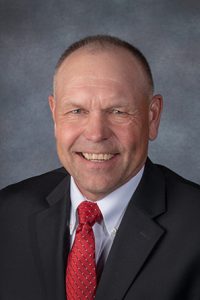Proposals to tax services, candy and soft drinks considered
The Revenue Committee heard testimony March 13 on two bills intended to stabilize Nebraska’s finances by broadening its sales tax base.

LB169, introduced by Plymouth Sen. Tom Brandt, would impose sales and use taxes on nearly two dozen currently exempt services including chartered flights, dating services, dry cleaning, marketing and swimming pool cleaning.
The state Department of Revenue estimates that the bill would increase state general fund revenue by $30.1 million in fiscal year 2025-26 and $46.7 million in FY2026-27.
LB170, also sponsored by Brandt, would eliminate sales and use tax exemptions for candy and soft drinks as defined in the bill. The measure would increase state general fund revenue by an estimated $25.6 million in FY2025-26 and $39.3 million in FY2026-27.
Brandt said the proposals would broaden Nebraska’s sales tax base to better reflect the modern economy, generating revenue that could be used to fill the state’s current budget gap and fund additional property tax relief.
“Our current tax system is outdated, with too many carveouts that create inconsistencies in how we apply sales tax,” he said.
Bruce Rieker testified in support of both measures on behalf of the Nebraska Farm Bureau and eight other agricultural organizations. He said the groups’ members are willing to pay higher sales taxes if the result is a balanced budget and a reduced property tax burden, which he said is growing by approximately $285 million per year.
“Like all other Nebraskans who utilize the services or goods that will be taxed if [the bills] are enacted, our members will pay those taxes too,” Rieker said.
Testifying in opposition to LB169 was William Barstow, an independent theater owner with multiple Nebraska locations. He said the bill would eliminate a sales tax exemption on film rental fees that theaters pay to movie distributors.
This would result in double taxation, Barstow said, as theaters already collect and remit tax on movie ticket sales.
“If LB169 passes, we would be required to pay an additional large tax burden on film rental fees — a business expense — essentially taxing the same dollar twice,” he said.
Tyson Schaffert, a professional tattooist in Lincoln, also testified in opposition to LB169. By imposing sales tax on tattoo and body modification services, he said, the bill would force small businesses to raise prices.
“Higher costs will drive consumers to unlicensed, underground providers, which is a true health hazard for the state,” Schaffert said.
Testifying in opposition to LB170 was Shannon McCord, owner of a grocery store in Superior. He said determining which items fall within the bill’s definition of candy would be cumbersome for smaller grocers.
“Looking at the ingredients of all the possible tax items in my store would be time consuming and expensive,” McCord said.
Bryan Slone testified in opposition to both measures on behalf of the state, Omaha and Lincoln chambers of commerce. Directing the newly generated sales tax revenue to property tax relief programs would shift taxes from one group of Nebraskans to another, he said.
“That does not mean that sales taxes should never be put on the table,” Slone said. “But this is not tax reduction — this is just changing who pays in Nebraska.”
The committee took no immediate action on either bill.


